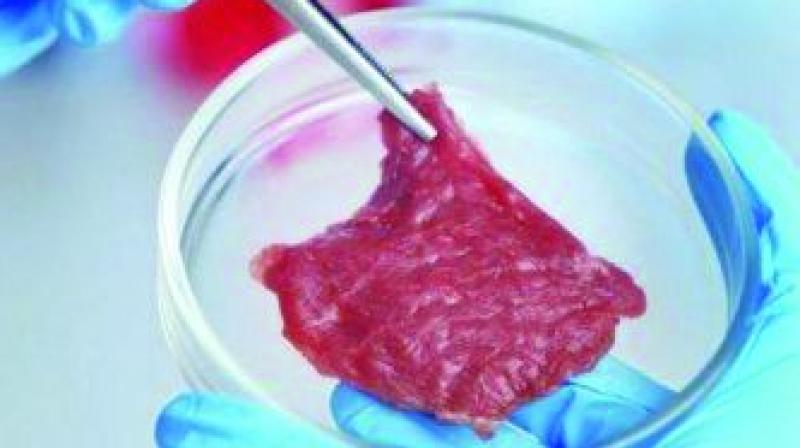60 per cent meat in 2040 may come from lab process

Illinois, Chicago: Sixty per cent of meat that people eat in 2040, will be either grown in labs (synthetic meat) or replaced by plant-based products that look and taste like meat.
The product is called by various names like cultured meat, slaughter-free meat, in vitro meat, vat-grown, cell-based meat or clean meat. Cultured meat is meat produced by in vitro cultivation of animal cells, instead of from slaughtered animals. It is like cellular agriculture.
The massive impact on environment due to conventional meat production and the concerns people have about the welfare of animals under industrial farming, has led to people adopting this meat, according to a report by the global consultancy AT Kearney who conducted interviews with experts.
“The large-scale livestock industry is viewed by many as an unnecessary evil,” the report says.
With a turnover of $1trillion a year and billions of animals raised, the conventional meat industry is a force to reckon with. However, the huge environmental impact, as revealed through recent scientific studies, from the emissions driving the climate crisis to wild habitats destroyed for farmland and the pollution of rivers and oceans, the lookout for alternatives has grown stronger.
Major meat firms like Beyond Meat, Impossible Foods and Just Foods that use plant ingredients to create replacement burgers, scrambled eggs and other products are growing rapidly.
An estimated $1bn has been invested in such vegan products, including by the companies that dominate the conventional meat market.
Beyond Meat raised $240m when the company went public in May. Its shares have more than doubled since then.
Other companies are working on growing meat cells in culture, to produce real meat without needing to raise and kill animals. Though no such products have reached consumers yet, AT Kearney predicts cultured meat will dominate in the long term as it reproduces the taste and feel of conventional meat more closely than plant-based alternatives.
“The shift towards flexitarian, vegetarian and vegan lifestyles is undeniable, with many consumers cutting down on their meat consumption as a result of becoming more conscious towards the environment and animal welfare,” said Carsten Gerhardt, a partner at AT Kearney. “For passionate meat-eaters, the predicted rise of cultured meat products means that they still get to enjoy the same diet they always have, but without the same environmental and animal cost attached.”
The report estimates 35 per cent of all meat will be cultured in 2040 and 25 per cent will be vegan replacements. It highlights the far greater efficiency of the alternatives to conventional meat.
Almost half the world’s crops are fed to livestock, but only 15 per cent of the plant calories end up being eaten by humans as meat. In contrast, the report says, cultured meat and vegan meat replacements retain about three-quarters of their input calories.
Potential customer uneasiness about cultured meat will not be a barrier, the report says, citing surveys in the US, China and India: “Cultured meat will win in the long run. However, novel vegan meat replacements will be essential in the transition phase.”

